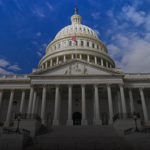Section 1
Preview this deck
Article 7 of the Constitution
Front
Active users
0
All-time users
0
Favorites
0
Last updated
4 years ago
Date created
Mar 1, 2020
Cards (81)
Section 1
(50 cards)
Article 7 of the Constitution
ratification process
Natural Rights
life, liberty, property (pursuit of happiness)
Marbury v Madison
1801 judicial review allows the supreme court to rule a law unconstitutional and void the law
Regents of the University of California v Bakke
1978 upheld affirmative action programs in school
McCulloch v Maryland
1819 established the constitution grants congress implied powers for implementing the expressed powers
John Locke's Two Treatises of Government
writing outlined the ideals of social contract theory and natural rights - dominant influence on Thomas Jefferson & first 3 paragraphs of dec of independence
Popular Sovereignty
all powers of government ultimately rest in the people
Common Law derived from
tradition and previous responses to situtions
Mapp v Ohio
1961 evidence obtained in violation of the 4th amendment - unreasonable search and seizure - could not be used in a state law criminal prosecution
Article 1 of the Constitution
the powers, eligibility requirements and limitations of the legislative branch
Article 6 of the Constitution
maintenance of previous debts, supremacy of the constitution, and oaths of office
Dred Scott v Sanford was overturned when
13, 14, 15th amendments were passed
Article 4 of the Constitution
the roles, rights, and privileges of the states and their citizens
Natural Law
laws universally organized by the virtue of human reason or human nature
Miranda v Arizona
1966 case found that a defendant had to be informed of his rights to consult an attorned for his testimony to be used in court
Communism
group of leaders dictate the allocation of resources to the entire population - no private property
Inalienable Rights
natural rights given to every person
Communist Manifesto
Karl Marx 1848 outlines the reasons and beliefs behind a communist structure of government
Declaration of Independence
outlines the political ideology of the american revolution and lays the foundation for the US Constitution
Oligarchy
rule by a small group of people
Cherokee Nation v Georgia
1831 ruled the cherokee nation did not have "original jurisdiction" to sue Georgia and the cherokee people were not a state
Korematsu v US
1944 ruled that japanese americans in internment camps was constitutional
Monarchy
one individual rules the entire country
Gideon v Wainwright
1963 ruled that courts were required to provide legal counsel to poor defendants in felony cases
US Constitution
1787 foundation for american government and is a blueprint for a constitutional government throughout the world
Checks and Balances
keeps one branch from becoming to powerful
Social Contract
individuals covenant with each other to create a form of government ex: preamble to the constitution
Plessy v Furgeson
1896 ruled that state laws requiring segregation in public and private sectors was unconstitutional, using "separate but equal"
Article 2 of the Constitution
the powers, eligibility requirements and limitations of the executive branch
Example of Natural Law
murder is wrong because it is against nature for one human to murder another
The general theory for Communist Manifesto was
as industrialization spreads, the workers will grow to resent the factory manager and owner as exploiting the labor of workers
Communist Manifesto was the foundation for
communist revolutionarise in europe, africa, and south america
Article 3 of the Constitution
the powers, eligibility requirements and limitations of the judicial branch
Natural Law and Natural Rights extend beyond
culture, society, or time period
Tinker v Des Moines
1969 students wearing black armbands to school to protest the vietnam war were within their constitutional rights
Hammurabi's Code
suggests a presumption of innocence and a rough outline that could act as a constitution; "eye for an eye"
US Government
democratic republic
Separation of Powers
3 branches
Socialism
the state redistributes resources from the wealthy to the poor and provides social services to the population
Justinian's Code of Laws
compilation and formal organization of roman laws dating back to the 6th century - foundation of jurisprudence during the reniassance
Federalism
power is shared between the branches, state, and national government
Article 5 of the Constitution
amendment process
Common Law
laws created and developed through judicial decision, by courts; case law.
Republicanism
elected reps determine the laws; certain rights are protected from the will of the people
US v Nixon
1974 Nixon tried to hold evidence in Watergate scandal - exercised checks and balances - president doesn't have absolute immunity from the judicial process
Dred Scott v Sanford
1857 african individuals sold to slaver were not and could not be citizens and did not have the rights protected in the constitution
Direct Democracy
every citizen has a direct vote in the government and for each policy; unmanageable because it's illogical for each person to cast a vote for each policy
Roe v Wade
1973 a woman has the rights to an abortion
Brown v Board of Edu of Topeka
1954 supreme court ruled in this case that segregation of public schools was unconstitutional - overturned plessy
Magna Carta
foundation for modern limited-government restricted the King of England's power
Section 2
(31 cards)



